How Trump's sweeping new policies could change travel
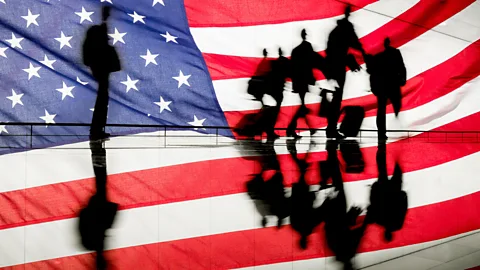 Alamy
AlamyAs the new US president makes massive governmental cuts, issues tariffs and leads an immigration crackdown, domestic and international tourism faces unprecedented changes.
In the United States, a new presidential administration always comes with policy shifts. But the dizzying speed with which President Donald Trump has issued executive orders and made sweeping federal changes during the first month of his second term has much of the world wondering what the long-term impacts of these changes might be, and what else is yet to come.
By threatening and instituting tariffs on longtime allies, moving to overhaul the US immigration system, promising "mass deportations" and empowering unelected billionaire Elon Musk to fire thousands of federal employees and potentially shutter entire agencies established by Congress, Trump has come out swinging in his second act. And while these policy shifts are likely to have far-reaching social, political and economic implications, experts say they will also have a huge impact on the US travel industry.
"From immigration rules to trade wars, these changes will make travel to and within the US a lot more complicated and way less appealing. It's like putting up a giant 'Do not enter' sign just as the world is getting back into full travel mode," said Kristin Winkaffe, founder of travel firm Winkaffe Global Travel. "If you make it harder for people to get visas, fewer people will come – it's that simple."
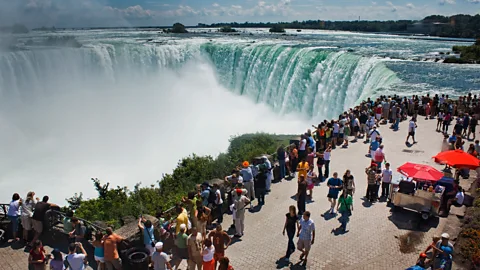 Alamy
AlamyThis already appears to be playing out with the US's northerly neighbour. As Trump continues to threaten tariffs against Canada, even proposing annexing the entire nation, some Canadians have started boycotting US travel. The US Travel Association has warned that a 10% reduction in Canadian visits could result in more than $2bn in lost spending and 14,000 job losses.
Yet, the new administration remains confident that its policy shifts will benefit travellers. "President Trump has entrusted this team to work tirelessly to reaffirm American's [sic] complete confidence in the safety of our transportation systems," newly appointed US Transportation Secretary Sean Duffy said in a statement. "Our focus remains on ushering in a golden age of transportation while prioritizing the Department's core mission of safety and delivering innovative projects that move America."
While the full scale of Trump's policy changes are yet to be seen, experts and travel professionals are keeping a close eye on the specific ways they may reshape travel. We spoke to some of them to find out how these impacts might affect domestic and international travellers.
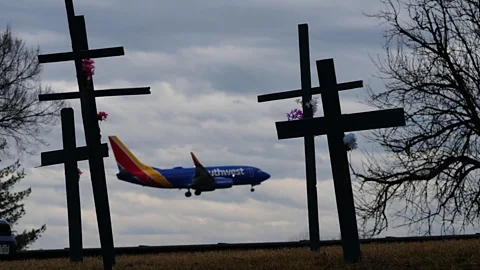 Alamy
AlamyAir travel
Perhaps no mode of travel has been more scrutinised in recent weeks than the aviation industry. In the past month, four fatal plane crashes in the US have led confidence in air travel to drop from 71% of Americans believing air travel is safe in January 2025, to 64% in February, according to a recent AP survey.
Trump's recent policy changes aren't likely to improve this number. Air traffic control staffing was already under pressure nationwide and has been indicated as the cause of near-misses. Yet, even after investigations into the recent crash in Washington DC that killed 67 passengers found that air traffic control staffing was not at normal levels, Trump's administration began firing hundreds of Federal Aviation Administration employees last week. He has also fired the heads of the Transportation Security Administration (TSA) and the Coast Guard, and disbanded the Aviation Security Advisory Committee, leaving some wondering if aviation safety would continue to be a federal priority.
The State Department also suspended all processing of passports with the X identity marker, leaving many non-binary Americans potentially cut off from international travel. More than 15 countries – including Australia, Canada, Colombia and India – allow citizens to amend their gender to non-binary or third gender, so it is yet to be determined how these visitors will be treated upon entry.
In addition, more than 200 TSA employees have been laid off so far, and many expect screening times – especially among international visitors – to go up. Some LGBTQ+ travellers, in particular, are concerned about how recent policy changes will affect air travel.
"States like Texas, which is a hub for two of the three major US carriers, are looking at enforcing bathroom use in all public buildings (including airports) along the lines of the binary sex you were assigned at birth," said Lindsey Danis, creator of outdoor travel blog Queer Adventurers. "Trans people would have to choose between complying with a law that would force use of the bathroom that aligns with their former gender or breaking the law and possibly being targeted for being in the 'wrong bathroom'."
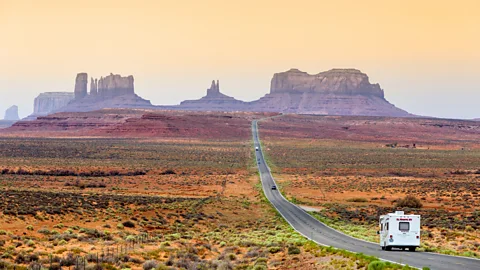 Alamy
AlamyRoad trips
With Trump threatening to tariff Canadian oil starting in March, experts expect gas prices to rise as much as $0.15 per gallon, potentially putting a damper on holiday road trips. Some believe that the president's focus on increasing domestic oil and gas production may temper the effects of tariffs on domestic gas prices, but that may take longer to see at the pump.
Even those with electric vehicles may have more trouble charging. Earlier this month, the Trump administration paused the National Electric Vehicle Infrastructure Program, a clean energy initiative that had allocated billions of dollars for states to create electric car charging stations since 2021.
Those hoping to drive to or through one of the US's spectacular national parks may also face extra challenges. President Trump recently fired 1,000 national park workers, leaving many to suspect that the staffing shortages will result in maintenance issues, shorter visitor centre hours and fewer amenities for travellers. Yosemite National Park, for instance, has already delayed its summer campground reservations.
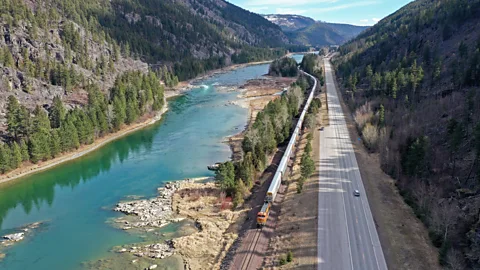 Alamy
AlamyTrain travel
Similarly, federal funding for train travel seems to be an area that the Trump administration has eyed cutting. As part of recent spending freezes (some of which were temporarily rescinded recently), the US Department of Transportation is under scrutiny, in particular for its rail-related spending. Experts think this is likely to affect the $22bn in annual Amtrak funding, the development of high-speed rail corridors and intercity passenger rail service and grants for railroad safety programmes (which work to improve dangerous railroad crossings).
More like this:
• The Alabama museum grappling with the 'Gulf of America'
It's not that rail is universally under attack, but some suspect that Trump may be looking to further privatise the industry. "Right now, there's a bigger push for private companies to take the lead in rail investment, which could bring fresh ideas and innovation but also raises questions about accessibility," said public policy advisor Justin Goldsberry. "Will ticket prices rise? Will service improve, or become limited in certain areas?"
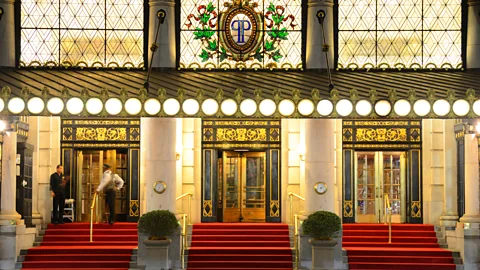 Alamy
AlamyHospitality
The leisure and hospitality industry is one of the US economy's biggest sectors, employing more than 10% of the American workforce. But policy uncertainty hasn't been good for business, especially from international business travellers.
"The US is one of the largest markets for business events (especially exhibitions), and leading US shows rely on a solid share of international and overseas attendees," said Kai Hattendorf, CEO at the global business events company HTF and former CEO of UFI The Global Association of the Exhibition Industry. "Policy uncertainty is disruptive for the sector, as event businesses crave predictability as they are planning years out, working with destinations and all actors from the travel and hospitality ecosystem."
He points to tech event CES in Las Vegas this past January when visitors from certain countries, including China, were down significantly. Hattendorf is noticing a growing number of events reportedly cancelled due to funding pulled from US government agencies and divisions as they enact new policies.
Other experts expect that as Trump's immigration crackdown looms, restaurants, hotels and – by extension – travellers are likely to feel the effects.
"The hospitality industry, one of the largest employers of immigrant workers, will take a direct hit if work visas like the H-2B become more restricted," said Neri Karra Sillaman, entrepreneurship expert at the University of Oxford and author of the forthcoming book Pioneers: 8 Principles of Business Longevity from Immigrant Entrepreneurs. "Post-pandemic labour shortages nearly brought the industry to its knees. If we see another round of restrictions, expect rising costs, declining service and economic losses in major travel hubs like New York, Miami and Los Angeles."
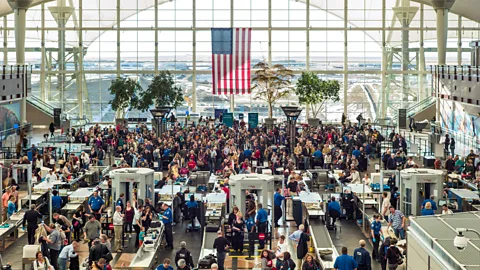 Alamy
AlamyVisas
President Trump's executive order focusing on "foreign terrorists and other national security and public safety threats" also put visas for foreign nationals in jeopardy. The order directs the Department of Homeland Security and the Department of State to implement enhanced vetting for both visa applicants and those currently in the country in order "to ensure that those aliens approved for admission into the United States do not intend to harm Americans or [its] national interests".
This means delays for those applying for visas, and visa appointments are likely to be delayed or suspended. Legal experts suspect particular scrutiny of those from high-risk countries, and most suspect a similar travel ban as was enacted in 2017 to be enacted once more.
"For international travellers, heightened visa scrutiny and extended processing times could mean fewer visitors and billions in lost tourism revenue," said Sillaman. "If the US makes itself a harder place to visit or do business, the rest of the world isn't going to wait. Other countries – Canada, the UK, Australia – are already rolling out policies to attract the talent that America risks turning away."
This could be especially problematic because the US is entering what policymakers are describing as a "mega decade" of sporting events. In 2026 the US will co-host the FIFA World Cup in 11 American cities, followed by the Summer Olympics in Los Angeles in 2028, the Men's Rugby World Cup in 2031, the Women's Rugby World Cup in 2033 and the Winter Olympics in Salt Lake City in 2034. Yet, a recent report by the US Travel Association put it bluntly: "We're not ready to host the upcoming mega decade of events that will draw millions of domestic and international travellers."
As US Travel Association CEO and president Geoff Freeman writes, slow visa processing times are the "single biggest deterrent to visiting the US". According to the State Department, wait times for visitor visas from certain nations such as Colombia can run up to 700 days, making it impossible for many travellers to attend next summer's FIFA World Cup. According to an Oxford Economics study cited in the report, if unaddressed, these days could result in a loss of nearly $19bn in spending in the next two years.
"America is staring at a historic opportunity," Freeman stated. "The question is whether we will seize the moment or fall maddeningly short."
--
If you liked this story, sign up for The Essential List newsletter – a handpicked selection of features, videos and can't-miss news, delivered to your inbox twice a week.
